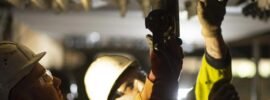Financial Times – Natalie Graham SEPTEMBER 18 2019
Andy Scott, 40, used a £5,000 inheritance to buy his first house for renovation at 18, and went on to develop more than 500 properties. He has also purchased a number of companies from administration before turning them round.
His companies are owned by REL UK Holdings, based in Oxford Circus, with 250 staff across the UK. It turned over £30m in 2018, after launching in 2016. Mr Scott himself owns eight businesses in transport, recruitment and leisure. He has five developments under way for 50 homes in the Home Counties, worth £15m.
He owns a group of transport companies including Bison Transport, Barnack Storage and Logistics and MSL Transport with 75 trucks and trailers, a group of temporary recruitment agencies including WestOne, which provides chefs to London’s top restaurants, Agentis and Grapevine, a provider to housebuilders. Mr Scott is a qualified pilot and flies his own plane, a Cirrus SR22 based at Cannes Airport.
Did you think you would get to where you are?
From a very early age I wanted to go out to work because studying was not for me. As an only child, I was quite close to my mother and her partner, who was a market trader. My mother was a book-keeper but had a streetwise commercial side to her and ran three sweet shops. I just saw myself as a dealmaker. At 18 I was running the front door of 1,000-plus capacity nightclubs across the south coast. I felt that I would be a good leader. I was good at talking to people and resolving situations. In that industry, communication is a more powerful weapon than your fists.
When you had made your first £1m did you want to slow down?
I made my first £1m profit at 26. I did not even think about it, I had so many balls in the air. There was no time to slow down. It was just about rolling over the money to the next project.
At 23 I had bought a 30-room hotel in Bournemouth. I built an extension with another 20 rooms, and increased the trade when I was running the hotel myself. I sold the place for £2m. I had to channel a chunk of the profit into some of my other projects that were not doing so well. The experience taught me a valuable lesson: not to overtrade.
What is the secret of your success?
I always try to see any negotiation from the other person’s side and understand what they want to get out of it. My starting point is if what they want to achieve works with them, does it work for me? I am also prepared to take more risk than others. A lot of people would not want to buy a firm in administration and take on 50-100 staff. There are no warranties when you take on an insolvent company. You are basically buying a business in a few days as opposed to taking three to six months with due diligence.
What was your best preparation for business?
From the age of 14 I used to buy old boats and repair them. At 16 I bought an old 30ft racing yacht for £250 from my savings and nightclub wages. I sold it for £3,000 a couple of years later. It took nearly a year to refit but I was quite good at getting people to help me. In my 20s I saw a boat chained to a jetty. It was the famous 72ft round-the-world “Whitbread” ketch. The marina office said the owners, a charity, had not paid the mooring fees. I ended up taking it off the charity for £12,000 which covered the mooring fees for one year. I got 10 friends to help me renovate the yacht in exchange for a trip of a lifetime, sailing across the Atlantic for 20 days, which in turn led to a slow sail around the world between business commitments. Five years later I sold that boat for £100,000.
What is your basic business philosophy?
For me a business is a project with a beginning, a middle and an ending. A lot of people have no consideration for the middle and the end. I operate by three Bs: buy in cheap, bolt on other businesses with synergy and build good management teams. What I cannot do is to take on the day-to-day operational management, but I watch the numbers on the spreadsheet like a hawk. Every Friday my teams and I get detailed numbers. Turnround businesses are usually lossmaking for the first three to six months. Most of them break even at best in year one. We have three management teams and each managing director has shares in the business so they can build their own portfolio.
What was the most challenging period of your career?
It was 2008, when the banking crisis came and everything stopped. The banks called in my loans of £10m. It became a domino effect because I had cross-guaranteed properties. Over six years I lost £6m in equity, cash and all my business interests. Then I was in a serious road accident, breaking both legs, and I was really low. I had to start again from nothing. So I helped manage other people’s building sites to survive.
I still had a 130ft schooner that I was refitting, but I could not afford to take it into a marina. It was anchored in the Caribbean, off Sint Maarten, and was worth £1m but it was not finished. I had had an agreement with the previous owner that I would do it up for him and we would share the profits. We had to sell it way below its value so I got nothing.
Do you want to carry on till you drop?
Yes, I do, working from a large sailing yacht, but for me it is not about money. It is about the thrill of the next project. I would get old very quickly, without the chess game of acquiring and developing property and businesses. It is like an addiction. Have you made any pension provision? No. Having made a lot of money in my 20s it was never a consideration. When I lost everything at 29 it did make me think about a pension, but I decided to back myself and just work harder. As my companies hopefully continue making a couple of million pounds profit a year I hope I will not have to worry. All my employees have a company pension.
Do you believe in giving something back to the community?
On my previous yacht we took eight inner-city kids out sailing for a couple of weekends. They came to us angry and with a bit of an attitude, but on the boat they had to work together as a team. I will plan more. I would like to do some business mentoring with young people, whom I find are often risk averse, worried about failure and what other people think of them because of social media. They have nothing to lose. Later on it is harder to break out of the safety net of a regular salary.
Do you allow yourself the odd indulgence?
I think your luxuries should pay for themselves as projects, so if I do up a home or a boat and enjoy it for a year I will sell it on at a profit. My current indulgence is a Classic Italian 72ft Sangermani yacht I rescued from being destroyed after a dispute in Italy. Everyone in Porto Lotti, La Spezia, was happy when I offered £12,000 to take the boat off them and pay the bills. It has been refitted and entered classic yacht regattas this summer. I will captain it myself, but it will be chartered out as well. I own a home in Fréjus, between Cannes and St Tropez. It was four flats that I am converting into one house. I spend a lot of time there, even though it is just a building site that is nearly complete.
Do you believe in leaving everything to one’s family?
I would like to make a will soon. As somebody who has created my own wealth, if I do have children I believe they should go out and make their own way in the world. I will definitely consider leaving money to maritime causes, like the RNLI.
How have you survived the recession?
Working on building sites I discovered there were quite a few cinemas and other interesting buildings closing. I approached the owners and offered to convert these buildings to nightclubs. I would often get agreed contributions of £300,000-plus to fit out the building and on completion I paid £100,000 rent a year for 20 years. Each time I did this it would take about six months to generate profits. These projects got me back on my feet. I also operated Number One Leicester Square, the largest club in the West End, which was converted into a hotel in 2015. There is not much you can do with vacant cinemas because the façades are often listed. This way I could bring them back to life and create a vibrant business.




